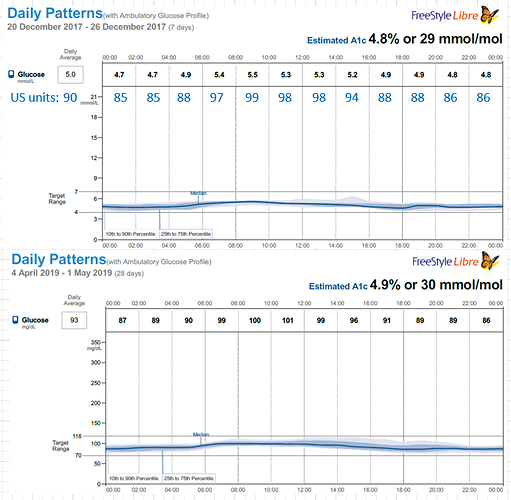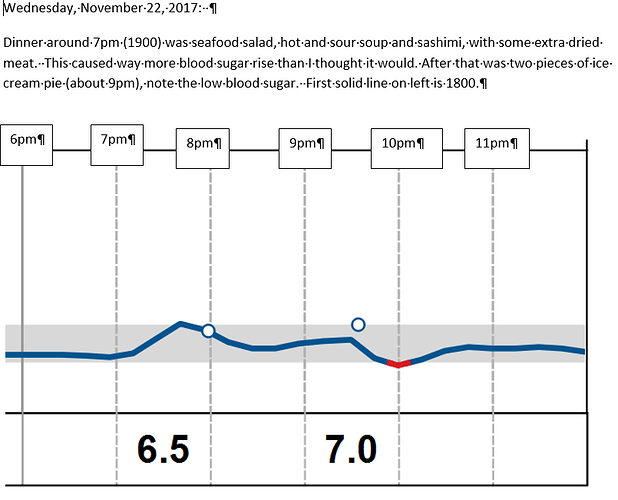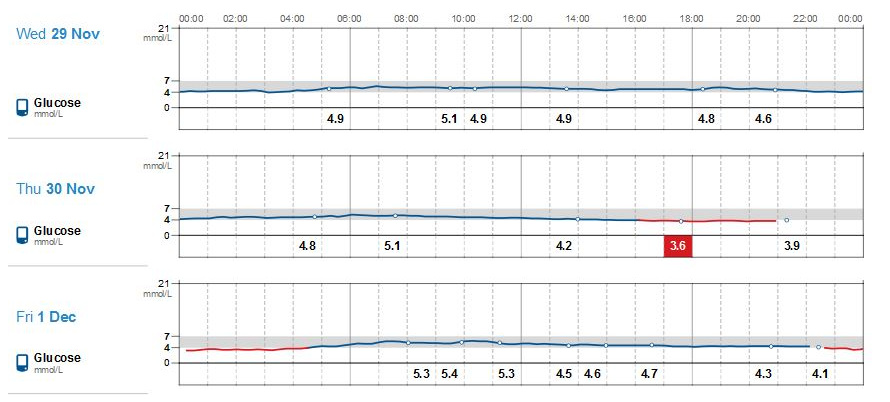I’ve read quite a few posts that some people have posted showing their blood glucose levels. Is this something that would be beneficial to me? I’m not really concerned with testing to see if I am in ketosis, from everything I understand if I’m keeping my carbs under 20g per day I am in ketosis, my daily carb intake is always under 20g and most fats under 10g. I am just curious is testing my blood glucose would be beneficial if so which monitor would you suggest I purchase?
Should I use a Blood glucose monitor
Blood glucose and ketones are two different things you can test. For me, they tend to go in opposite directions: higher blood glucose (eg, in the morning for me) means lower ketones; lower blood glucose (in the evening for me) means higher ketones.
I personally found a CGM (continuous glucose monitor) to be the best thing I’ve used. I learned a ton. But they are very expensive right now (or were when I looked), and where I live, you have to get a doctor’s prescription. In other countries, you don’t.
Like many things, it’s your call. If you get into numbers, go for it. I’ve never tested anything. I even limit my time on the scales. There is no “should” in this area.
Not really, if you’re not a diabetic, not eating things that constantly spike your blood glucose off the charts there’s really no reason to consume yourself with it. If you want an overall picture grab an at home A1C test which will give you a 3mo average which is far more important than your sugar readings at any one time.
Am I reading that one wrong? That’s not enough fat for anybody regardless of eating keto or not. Unlike carbs fat is an essential macro (so is protein).
There’s no way I could’ve learned something like this without a CGM:
Or the first part of this, where I ordered what I thought was “safe” food:
Or what happens when I eat real pizza, which causes 2+ hours of high blood sugar:
Or this is what fasting (Thursday) looks like:
I could go on.
I use a CGM intermittently as a validation check. Most folks guess how and how much stuff they eat effects them - a CGM, even used only intermittently, exposes wishful thinking. When you’re not weighing and measuring you’re guestimating, which is just another word for wishful thinking. True, the CGM only measures BG. Other things like insulin are just as or even more important - but with current technology we are unlikely ever to see a continuous home insulin measure.
As pointed out by @ctviggen above, the shape of the CGM curve through the day tells you a lot of other stuff indirectly. If you’re eating healthily keto - for whatever your specific situation may be - that CGM daily plot will resemble a straight line. The less it resembles a straight line the stronger the indication that things aren’t well - or at least not as well as they could be.
I was not a diagnosed diabetic when I started keto. I purchased a blood glucose monitor after about 18 months in ketosis, but my blood glucose was so stable by then, it did not matter.
I found it was much better to go off how I felt after eating certain foods than to try to measure something. Getting bogged down with numbers can prevent you from paying attention to your body. As I relied on how I felt, I was able to really get to the route cause of when I was actually hungry and actually full. It cut through the emotional and fake hunger aspects of eating, and allowed me to become more content.
Theoretically - in an academic way - how you feel should reflect your metabolic state and potentially your overall health. However, your subjective feelings can be very misleading when your metabolism is messed up. Most folks on this forum got here from ‘paying attention to their bodies’ and ending up obese and/or diabetic because their bodies sent the wrong signals. Also, many folks report that they do not experience any of the so-called ‘keto - feel-good - effects’ even after months or years in consistent ketosis. Some even report that they feel worse eating keto then they did eating SAD. There are a few here who advocate eating higher carbs because ‘keto doesn’t necessarily work for everyone’. See the discussion here, for example. Going on your feelings is great, if it works, but having some significant data to back up the feelings works better. In my opinion.
If you aren’t restricting carbs, it gives you a good way to measure postprandial glucose excursions for specific carby foods that you can remove from your diet. If you’re diabetic or want to validate that low carb/keto is keeping your blood glucose stable, most definitely worth it.
Are you doing under 20g net or total carbs? If net, it might give you some insight into how fiber or sugar alcohols affect your BG. If total, it might show you over time how your numbers will come down while continuing this WOE. A1C measurement would probably be sufficient to do this too.
Thanks for all the response. For now I think I’m going to continue without that, things seem to be going very well. I do think I will get ind at some point just for the sake of knowledge
If you were dead set on getting a monitor, I’d recommend the KetoMojo - even if you only used the glucose measurement side, if you ever wondered about ketones, you could measure that as well.
And as a self-described data geek, it’s hard for me to say “don’t bother” gathering data. But I think you’re right to just let this idea go. 
Although I’m not a diabetic, I found measuring my glucose (and BHB ketones) each morning and at various timed intervals after eating certain foods taught me a great deal about how my own body reacted to various circumstances.
But the truth is, it was more for my head than for my body. I was going to keep doing what I felt were the “right” things regardless. Hence, the data gathering was not changing any decisions. And data that is not actionable remains just data - not information.
And so, since you aren’t clamoring for data and are doing just fine without a monitor then don’t let the OCD of others (like me?) get in your way on your path to continued success. 
Just curious, did you make note of how you felt when blood sugar was 3.6? How low is too low in a fasting or keto state?




